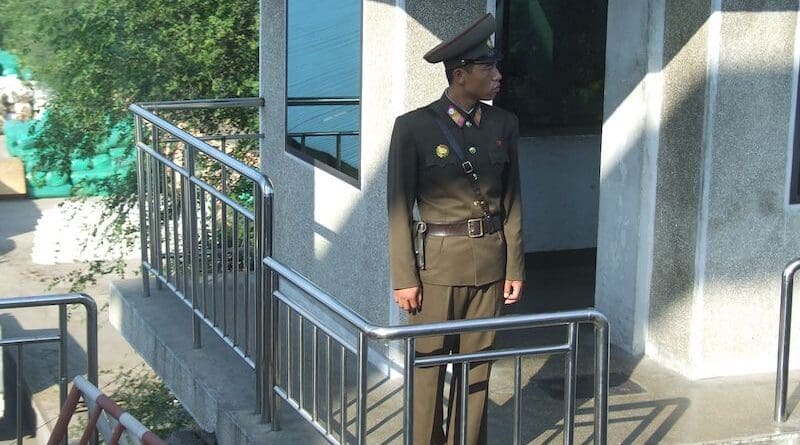North Korea: Sealing China Border Worsens Crisis, Says HRW
North Korea’s government under Kim Jong Un has effectively sealed its northern border with China, worsening an already grave humanitarian and human rights situation in the country, Human Rights Watch said in a new report.
The 148-page report, “‘A Sense of Terror Stronger than a Bullet’: The Closing of North Korea 2018-2023,” documents the Democratic People’s Republic of Korea’s (DPRK or North Korea) overbroad, excessive, and unnecessary measures during the Covid-19 pandemic, including quarantines and new restrictions on economic activity and freedom of movement. The government’s new measures have severely affected food security and the availability of products needed by North Koreans to survive that previously entered the country via formal or informal trade routes from China. United Nations Security Council sanctions from 2016 and 2017 limited most exports and some imports, harming the country’s economy as well as people’s ability to make a living and access food and essential goods.
“North Korea’s sealing of its border since 2020 and the unintended effects of UN Security Council sanctions since 2017 have increased hardships on the long-suffering North Korean people,” said Lina Yoon, senior Korea researcher at Human Rights Watch. “North Korean leader Kim Jong Un should end the policies that have essentially made North Korea a giant prison, reopen its borders for trade, relax internal travel restrictions, and allow monitored international emergency assistance.”
Concerned governments should urgently address the impact of North Korea’s increased isolation on the basic rights of North Koreans. Even before new restrictions were put in place, North Korea was among the most isolated and repressive countries in the world.
From 2015 through 2023, Human Rights Watch interviewed almost 150 North Koreans outside the country, including 32 North Korean escapees with knowledge or experience of relevant conditions in recent years. Human Rights Watch also made extensive use of satellite imagery, analysis of open-source videos and photographs, interviews with journalists and activists with contacts inside the country and in China, international trade data, media reports, and academic studies.
Cross-border activities decreased in late 2017 after UN Security Council sanctions in 2016 and 2017 led China to impose strict new trade and travel controls on its side of the border. Cross-border travel and trade decreased further during the Covid-19 pandemic.
After the start of the pandemic in 2020, the North Korean government sealed the country’s borders by constructing new and expanded fences and guard posts and strictly enforcing rules, including a standing order for border guards to “shoot on sight” any person or animal approaching the border without permission. The border crackdown compounded the negative effects of earlier UN Security Council sanctions.
North Korean authorities also clamped down on bribery and various forms of low-level unsanctioned economic activity, which since the 1990s had enabled people to maneuver around overbroad governmental controls. Many families need to engage in these vital activities to obtain money or food to survive. The government also further tightened restrictions on communication with the outside world and access to information, while intensifying other ideological controls to prevent unrest.
The new restrictions enabled the government to strengthen its grip on power and reimpose control where its dominance had weakened over the past 30 years: in particular, over the border, market activity, unsanctioned travel, and access to information.
Satellite images starkly reveal the increased security enforcement on the North Korean side of its northern border after early 2020. An in-depth analysis of six selected border areas, totaling 321 kilometers, shows that North Korean authorities fenced off almost all the analyzed areas by 2022 or 2023, with almost 500 kilometers of new fences.
Most of the areas that Human Rights Watch analyzed now have two, and in one small part three, layers of fences. Images also show upgraded primary fences in several areas, new or improved guard patrol paths, as well as new garrisons, watchtowers, and guard posts. In the areas analyzed, Human Rights Watch found a 20-fold increase in security facilities since 2019. A total of 6,820 facilities have been placed near new or improved fences, an average of one every 110 meters. The government’s expanded internal security at its northern border has made almost all unsanctioned domestic and international travel impossible, whether to conduct informal commercial activities or to escape the country.
Even before the Covid-19 pandemic, North Korea was one of the poorest countries in the world. The government has long struggled to ensure food security, adequate childhood nutrition, and access to medicine. For decades, the government has prioritized the development of nuclear weapons and missile programs over basic social services, diverting billions of dollars of revenues that could have been spent on social and public services and infrastructure to spur economic growth and promote economic and social rights.
The UN Security Council should urgently review current sanctions on North Korea, and the measures states take to enforce them, to evaluate their impacts on human rights and delivery of humanitarian aid, Human Rights Watch said. They should also seek more information from UN officials about the connections between North Korea’s weapons programs and its human rights situation.
“North Koreans have lived in deprivation and isolation for decades,” Yoon said. “The UN Security Council and concerned governments should press Kim Jong Un to end the country’s systematic human rights abuses and begin a dialogue to reopen the country to the outside world.”

